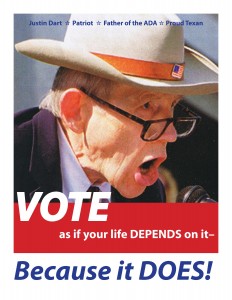Early voting ends tomorrow, and Election Day is next Tuesday, November 6th, 2018. Reflecting on my voting experiences in the past, they have been exhilarating, exasperating, tense, wondering which way the vote would swing, and I will admit, I haven’t often paid much attention to those with disabilities coming to vote, what it might have taken them just to get there, and how informed they might be of their voting rights. This mid-term election is very important in many states, so I did a little investigation as to what the State of Texas must provide by law to people with disabilities who need assistance in getting to the polls or casting their ballot. Here is some information about voting accessibility rights, which you can find in full on REV UP Texas’ website:

Accessible Voting Systems
In every federal election (and most nonfederal elections), each polling place will offer at least one type of accessible voting equipment or Direct Record Electronic (“DRE”) device. This equipment allows voters with disabilities to vote directly on the system or assist them in marking the paper ballot. Depending on the type of system, voters with disabilities may use headphones or other assistive devices to help them vote independently and secretly.
All Polling Places in Texas Must be Accessible
Polling places should support voters, not hinder them. For Help, Call Disability Rights Texas’ Voting Hotline at 1-888-796-VOTE (8683).
Voters May Receive Assistance at the Polls
Tell the election official if you are a voter who needs help to vote. You do not have to provide proof of your disability. Voters are entitled to receive assistance if they:
- Cannot read or write; or
- Have a physical disability that prevents them from reading or marking the ballot; or
- Cannot speak English, or communicate only with sign language, and want assistance in communicating with election officials.
Voters may be assisted by:
- Any person the voter chooses who is not an election worker;
- Two election workers on Election Day; or
- One election worker during early voting.
Voters May Use Interpreters at the Polls
Voters who cannot speak English, or who communicate only with sign language, may use an interpreter to help them communicate with election officials, regardless of whether the election official(s) attending to the voter can speak the same language as the voter. The voter may select any person other than the voter’s employer, an agent of the voter’s employer, or an officer or agent of a labor union to which the voter belongs. If the voter cannot read the languages on the ballot, the interpreter may also assist by translating the language on the ballot for the voter in the voting booth.
Curbside Voting
If a voter is physically unable to enter the polling place, he or she may ask that an election officer bring a ballot to the entrance of the polling place or to a car at parked at the curbside. After the voter marks the ballot, they will give it to the election officer, who will put it in the ballot box. Or, at the voter’s request, a companion may hand the voter a ballot and deposit it for him or her.
In Review
You have a right to voting accommodations on Election Day! You can:
- Ask an election worker to hold your spot in line while you sit down
- Bring someone to help you
- Have headphones to hear your ballot
- Get sample ballots in an alternate format
- Request accessible parking or temporary ramps
- Use a communication board
- Access voting machines for voters in wheelchairs
